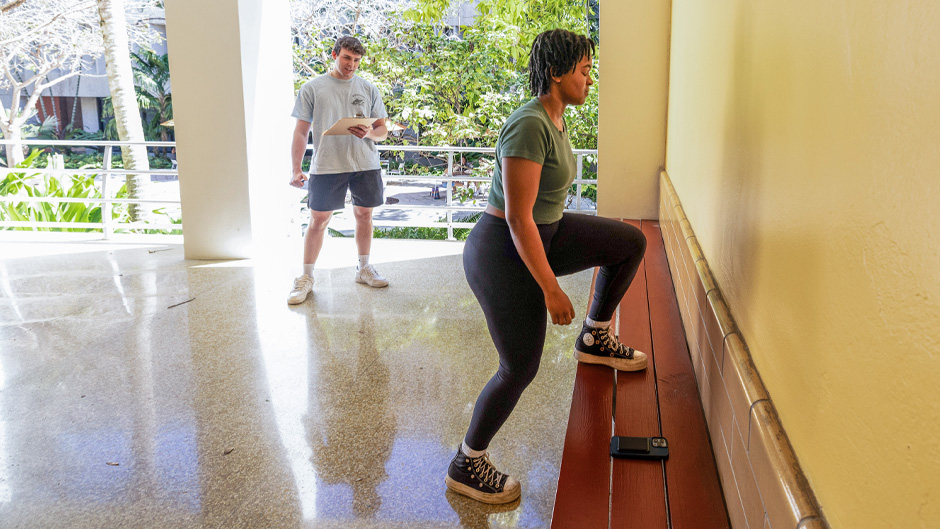Chelsey Reynolds, a senior studying biomedical engineering at the University of Miami, spent an hour on a recent Friday hooked up to several machines at the new Vascular Function Laboratory at the University of Miami School of Education and Human Development. The lab is under the leadership of professor Arlette Perry from the Department of Kinesiology and Sport Sciences, who also oversees the Laboratory of Clinical and Applied Physiology.
Reynolds was put through a battery of tests which included a Queen College Step Test, where she repeatedly stepped on and off a high bench for three minutes to see how her heart rate reacted to the stress. At the end of the exercise, she was out of breath, and her heart rate was 190.
“When I signed up for this study, I expected to be asked a few questions and to fill out some questionnaires,” she said. “But I guess all this exercise is worth it if it all comes out okay.”
Reynolds is one of 20 participants in a study on African American women being conducted at the laboratory on the third floor of the Solomon G. Merrick Building, which seeks to gauge the vascular health, physical activities levels, and body composition of young Black women ages 18-29 in relation to their perceived general stress, racial stress, and coping skills.
For the study, researchers have collaborated with professor MarieGuerda Nicolas in the Department of Educational and Psychological Studies to evaluate Black females. The study is the thesis of doctoral student Ceewin Louder.
Cardiovascular disease is the No. 1 killer for all women, but Black women experience the highest burden. Nearly 60 percent of Black women ages 20 and over are living with some form of cardiovascular disease, experts say.
The best way to prevent heart disease is preventive measures, said Perry.
As part of the test, the women are given a questionnaire that includes their dietary habits, exercise regimen, and how issues of race and racial inequality have affected them. Studies show that being exposed to or displaying chronic vigilance for discrimination can be a stressor that can lead to depression, as well as increases in blood pressure, heart rate, and stress hormones.
Reynolds admits that when the issue of affirmative action was in the news, she felt stress.
“But I cope by taking time for myself and doing something that I enjoy, like reading a book or walking,” she said. She also engages in a daily cardio exercise and tries to be mindful of her diet, although she enjoys a brownie now and then.
For Mikayla Godbolt, a junior at the University who is also taking part in the study, the study could provide some tips on how to maintain her health.
She admits that issues of race do affect her.
“Sometimes those issues affect me because you have to be conscious of prejudice,” she said. “You are conscious of the fact that some people will treat you differently because you look different.”
But she tries not to let those issues define her and tries not to internalize the prejudice, she said.
Besides the African American women study, the new laboratory is carrying out several other tests, said Perry. The Laboratory of Clinical and Applied Physiology features a state-of-the-art electronic classroom containing a large accumulation of anatomical models. It also houses some of the most sophisticated noninvasive equipment for evaluating vascular health and cardiac risk.
Graduate student Wei Xiong, who works with Perry, has become an expert at measuring vascular health and cardiac risk. He has evaluated more than 400 subjects in the lab so far, according to Perry.
“This Vascular Health Project has far-reaching implications for the future of health promotion and disease prevention,” said Perry. “The results of the project will be utilized to identify at-risk populations incorporating data on age, race, and gender. The identification of body composition, nutrient intake, and physical activity predictors will be used to develop more targeted exercise programs focusing on various components of cardiac health.”
So far, the lab has conducted studies on:
- Young children: Studying young children’s physical, psychological, and educational health by bringing University laboratory equipment into Henry S. West Laboratory School to measure vascular function and cardiovascular health in middle school adolescents.
- Postmenopausal women: Examining body composition, physical fitness, and nutrition predictors of vascular function and cardiac risk in older postmenopausal Asian women.
- College-age men and women: A study to see how gender differences are predictors of vascular health and cardiovascular risk.
“All data will be used to construct a giant database of vascular function and cardiac risk and its predictors across the lifespan,” said Perry. “This will be examined by age, race, and gender.”

